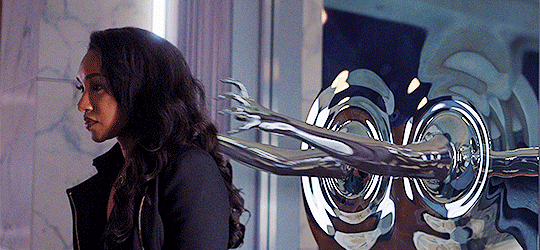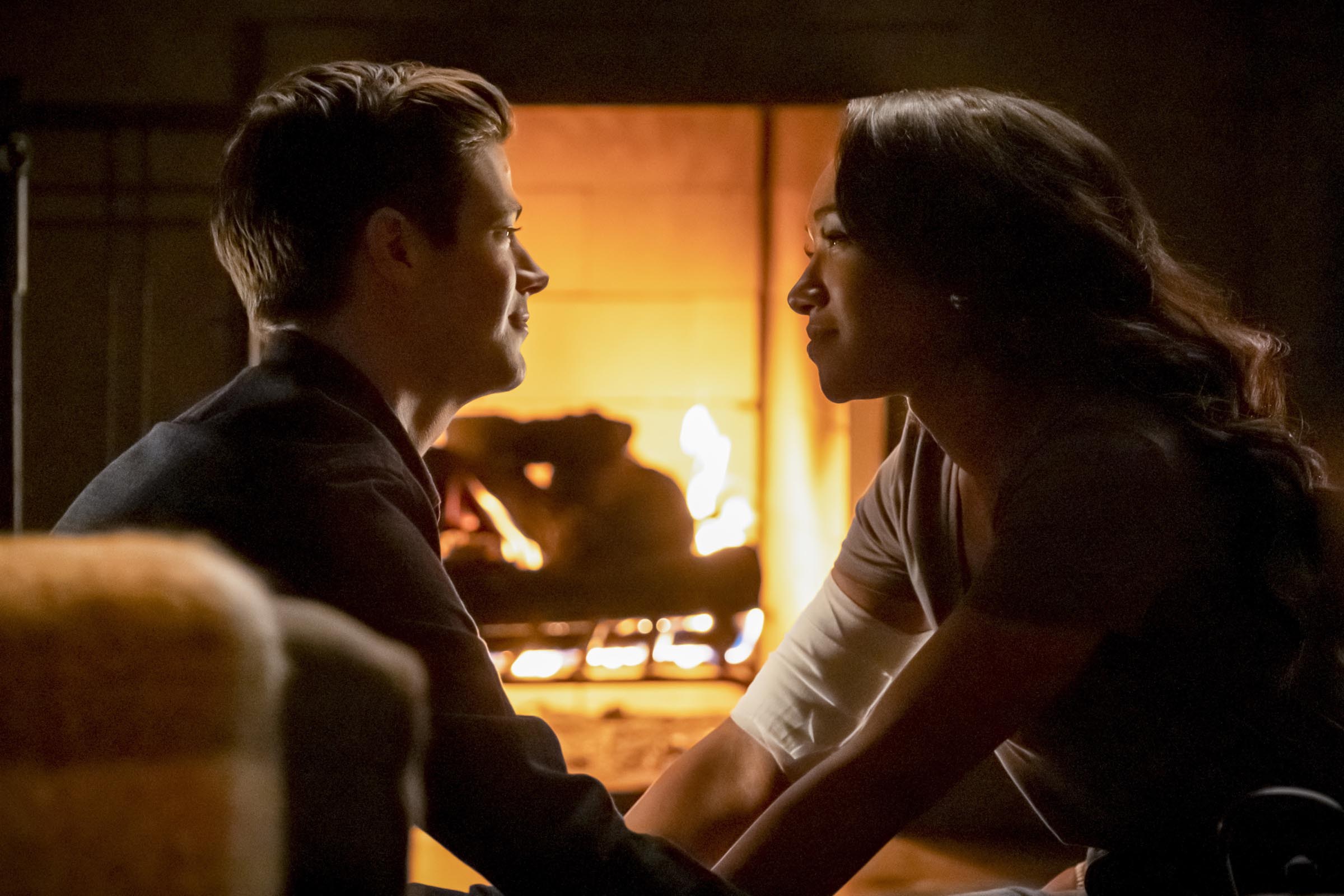
This week’s episode of The Flash, “Marathon,” did something daring in focusing more on the importance of the characters’ humanity over their heroism. One wouldn’t think this would require much bravery, but anyone who’s been around fandom of a superhero property for any length of time at all would probably acknowledge that it’s the human characters in these stories that tend to receive a disproportionately large amount of hatred. Why is that? Is it because, as we fantasize about the heroes we wish we could be, we don’t want to be reminded of the ordinary people we are? (Though sexism also has its part to play.)
Whatever the reason, the fact is that human characters in superhero stories are incredibly important. As fans of superhero media, we may fantasize about having incredible powers, but we are more like the regular humans in the stories than the superheroes we admire. The superpowered characters show us the heroes that we wish we could be, but it’s the human characters that show us who we could be in reality. If only we could be a little bit brave.
And so it’s the regular, human characters that act as the voice of the audience. When it comes to characters like The Flash’s Iris West, they also can act as the voice of the ordinary citizens in the city, who admire – or revile – the titular superheroes. It is one thing to be told that a hero is beloved. It is another to witness (through these ordinary, human characters) how much they have come to mean to the nameless, faceless people of the city. Just like it is one thing to be told that two characters are friends, but it’s another thing to emotionally connect to a friendship we are allowed to watch deepen and grow.
Human characters also bring the stakes to superhero shows. As much as fandom calls for shows to focus on superheroics and nothing else, the fact is that an hour-long fistfight week after week, with nothing else to deepen the story would get old fast. Human characters – often in the form of one-time nameless extras – also present the hero with someone to save. They often represent the stakes to whatever battle the hero faces. Without a consequence, or something to fight for, does it really matter if the hero wins or loses in the end? We root for the hero because his failure means the death of a loved one, the loss of a city full of strangers, the end of the world and the billions of people who live on it.
And it is often the human characters in these superhero stories that remind us that those countless, nameless, everyday people – the people our heroes strive to save week after week – exist.
Yet it isn’t just the human characters but the human side of superhero characters that are important. The show may be called The Flash, but as fans, we care as much about Barry Allen, the man. Cisco Ramon. Caitlin Snow. Harri…well, okay, that one’s a bit tricky, since he swaps out every season or so. Still, ask a random Cisco to tell you why they love him so much, and I expect they’re at least as likely to talk about his family, his predilection for pop culture references and other people’s Jell-O, and the highlights of his wardrobe as they are to talk about the physics of being Vibe.

The Flash has too often dropped the ball on giving their human characters proper arcs, just as the show has often failed to give the people under the masks their due. Earlier this season, when Joe presented Barry Allen, CSI, with a medal for his work for the city, we cared about that moment because we like Barry and because that moment he shared with Joe was touching. But did we really feel the emotion of that moment because we truly have a sense of what Barry Allen, CSI means to the city, and not the Flash? (Do we even know how the city responded to the fact he was in jail for murder not that long ago? Does everyone really believe he was wrongfully imprisoned because if it’s anything like real life, there’s no way that sense of trust would be unanimously restored.)
More often than not, the human side of these characters is ignored in favor of their roles on the team. The focus is on Team Flash; the fact that these characters are – and should be – friends outside of their work on the team is at best a subplot. Off the top of my head, I’d venture a guess to say we get maybe two episodes a season – max – where we’re allowed to see everyone enjoy each other’s company. To be friends, not just members of a team. To see why they’d still want to be friends, even if they didn’t have to band together to save the world.
Exploring the human sides of these characters also opens up the door for new plot lines – and the introduction of weekly villains without always relying on the same two plot devices. One villain is introduced because Iris heard about something impossible while investigating a story. Another is introduced when Ralph stumbled across something alarming on a case. And just imagine what could happen if they ever unchained Cisco and Caitiin Frost from their desks and let them go out and have a life once in a while. Let alone if they were allowed to get jobs that actually paid them, outside of the lab. Imagine if Caitlin was an ER doctor in Central City, the strange and inexplicable things that might come through her doors, leading to the next big mystery. And if Cisco owned his own tech company, it could act like a massive honeytrap, right in the heart of the city. Just imagine how many bad guys would waltz through the building’s security in an attempt to steal the latest tech.
Okay, I guess that wouldn’t be too different than what happens at S.T.A.R. Labs.

But if there’s one thing I would like to see changed in the back half of The Flash’s sixth season, it’s…well, there are a lot of things I think they need to change, I’m afraid. But certainly one of them is that I would love to see them embrace the importance of the human side of their story. Their treatment of Caitlin versus Killer Frost in the first half of the season was a glaring example of their inability or unwillingness to do so before. But these human characters – Iris, Joe, Kamilla – are important to the story. As are the human sides of the superheroes we love so much.
This week’s episode of the series, “Marathon,” put a refreshing focus on the human side of the story in both the A- and B-plots. For Barry, this focus came in the form of a mask, left to him by Oliver upon his death. It was the mask Barry had once gifted the Emerald Archer, and while Barry initially assumes it was left for him as a warning from one superhero to another, Diggle eventually helps him realize the truth. “Life is more than just a mission.” Life is more than superheroics and saving the world. It’s also being with the people you care about, building a life with the one you love. It’s about family and the future you want to build together. It’s not just about saving lives; it’s about living your own life, as well. It is a lesson Barry forgot in the lead-in to Crisis, but one I hope the show will never again forget.
Of course, the main focus this episode was on Iris and her investigation of Black Hole, which introduced the Big Bad for the second half of the season. This focus on Iris’s role as a journalist, and the way journalism can not just drive the story but to connect the faceless people of the city to the major threats facing our titular superhero every week, has been long overdue.

In pursuing the truth behind Black Hole, even in light of a threat upon her own life, Iris demonstrated the qualities that had once made her such an effective member of the team. Her bravery, resilience, quick thinking, and decisiveness were all on display, as was her determination to do what needs to be done, no matter the personal cost to herself.
She was, once again, a reminder of the heroes that we all could be, with enough bravery and determination to stand up for the truth.
Her story was the driving force behind “Marathon,” showing what the series could do if it just embraced the human side of these characters a little bit more. Standing up against CEO of McCulloch Technologies, Joseph Carver, and his assassin, Kimiyo Hoshi, she was fearless, her resolve to get to the truth unwavering. But it also opened up the world of The Flash a little more, introducing a different kind of villain into the mix. Leading up to this point, the villain has been a person (or a couple of people). People with superpowers, to be sure, but still just a person. The Flash may have to be savvy about how he approaches the problem, but he can take down one or two people in the end fairly easily, if he just uses his brain and his speed.
But how does one superhero – or even a handful of superheroes – take down a vast, faceless conspiracy? How many people are involved? Even if he can stop Carver, will that really stop Black Hole? It’s a different kind of villain for the series, and Iris’s role as journalist was the perfect way to introduce it.
I’d like to see the show explore the human side of my favorite superhero show more. That isn’t to say I don’t want The Flash to feature, well, the Flash. But I don’t just love the Scarlet Speedster; I love Barry Allen, the man beneath the mask, as well. I enjoyed watching Iris lead the team, but there’s more than one way that she’s a hero. There’s more than one way that we could all be heroes in our real lives, if we tried. And I’d like to see that more.

I also really want to see what’s happening with Iris in the mirror world, thanks to that jaw-dropping cliffhanger in the episode’s stinger. But that’s a mystery for next week.
The Flash airs Tuesdays at 8/7c on The CW.

